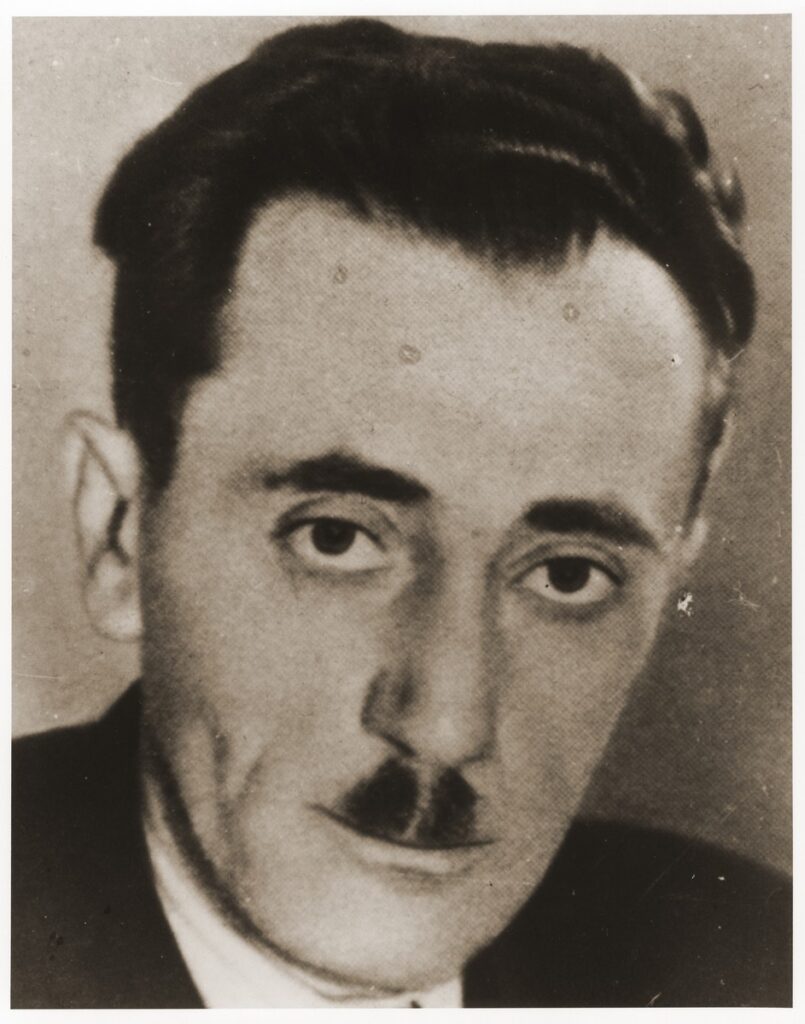Szmul Mordechaj Zygielbojm
Szmul Mordechaj Zygielbojm (pseudonym “Artur”) (1895–1943) – during the Second World War, he was the Jewish delegate to the London-based National Council of Poland. Protesting against the passivity of the world in the face of the Holocaust, he committed suicide on 12 May 1943.

Szmul Zygielbojm was born on 21 February 1895 in Borowica, a small town situated near Krasnystaw in the Lublin region. He was the oldest son of Józef and Henie née Pinkier. The spouses had eleven children in total. Some years after his birth, the whole family moved to Krasnystaw. Their difficult material situation forced Szmul to leave school as a young boy and take up employment. Initially, he trained as a carpenter, but after losing two fingers of his left hand he became a baker’s assistant. Later, he went to Warsaw to further educate himself in his chosen profession. During the First World War, he lived in Chełm, where he joined the local structures of the Bund. He also married Gołda née Sperling, a seamstress. Their marriage produced two children – Józef Lejb and Rywka. In 1917, he was appointed a delegate to the First Congress of the Bund in Lublin.
In the first weeks of the Second World War, the spouses returned to Warsaw. Among others, Szmul worked to help Jewish labourers join the Workers’ Warsaw Defence Battalions. He soon became heavily involved in bringing about the resumption of the Bund’s activities – obviously illegal – in the Polish capital. Initially, he was also a member of the Judenrat, but he resigned in protest against plans to create a ghetto in the city.
In January 1940, persuaded by his comrades from the Bund that he should remain inconspicuous and not endanger himself by his activities, he left Poland for Brussels. After the Germans occupied Belgium, he moved to France, while in September 1940 he left for the United States. Szmul Zygielbojm’s family remained in occupied Poland. In due course they were sent to the Warsaw Ghetto.
Szmul Zygielbojm’s key mission was to inform the world about what was happening in Poland. He travelled extensively throughout Europe and the United States, giving numerous lectures on the matter.
In February 1942, Zygielbojm was appointed a member of the National Council of Poland in London – a body of the Polish government in exile. His efforts to inform the world about German policy, including about the extermination of Jews, gained momentum. He gathered information about what was happening in the occupied homeland from, among others, the reports of the Polish resistance, as well as from materials provided by Jewish organizations, and in particular the Bund. The news coming from Poland deteriorated markedly after May 1942, when Operation Reinhard reached its zenith. Zygielbojm also sought to attract the attention of key politicians, including US President Franklin Delano Roosevelt and British Prime Minister Winston Churchill.
Gradually, he became aware that his actions (and those of others) would not bring about the immediate response which the Jews – now being murdered en masse – so desperately needed. He also noticed that the Allies did not intend to conduct a reckoning of German crimes before the conflict ended.
In protest, and moved to despair by his awareness of what had happened to the Jewish communities of Warsaw and numerous other towns in occupied Poland, he committed suicide during the night from 11 to 12 May 1943. At the time, the Warsaw Ghetto Uprising was in its death throes, and only a few residual ghettos were left in the entire General Government. Zygielbojm left three farewell letters: one addressed to his brother Fajwel, one to his party comrades in the United States, and one to the Polish President and the Prime Minister of the Polish government in exile.

May 11, 1943
To His Excellency The President of the Republic of Poland Wladyslaw Raczkiewicz
Prime MinisterGeneral Wladyslaw Sikorski
Mr. President,
Mr. Prime Minister,
I am taking the liberty of addressing to you, Sirs, these my last words, and through you to the Polish Government and the people of Poland, and to the governments and people of the Allies, and to the conscience of the whole world:
The latest news that has reached us from Poland makes it clear beyond any doubt that the Germans are now murdering the last remnants of the Jews in Poland with unbridled cruelty. Behind the walls of the ghetto the last act of this tragedy is now being played out.
The responsibility for the crime of the murder of the whole Jewish nationality in Poland rests first of all on those who are carrying it out, but indirectly it falls also upon the whole of humanity, on the peoples of the Allied nations and on their governments, who up to this day have not taken any real steps to halt this crime. by looking on passively upon this murder of defenseless millions tortured children, women and men they have become partners to the responsibility.
I am obliged to state that although the Polish Government contributed largely to the arousing of public opinion in the world, it still did not do enough. It did not do anything that was not routine, that might have been appropriate to the dimensions of the tragedy taking place in Poland.
Of close to 3.5 million Polish Jews and about 700,000 Jews who have been deported to Poland from other countries, there were, according to the official figures of the Bund transmitted by the Representative of the Government,** only 300,000 still alive in April of this year. And the murder continues without end.
I cannot continue to live and to be silent while the remnants of Polish Jewry, whose representative I am, are being murdered. My comrades in the Warsaw ghetto fell with arms in their hands in the last heroic battle. I was not permitted to fall like them, together with them, but I belong with them, to their mass grave.
By my death, I wish to give expression to my most profound protest against the inaction in which the world watches and permits the destruction of the Jewish people.
I know that there is no great value to the life of a man, especially today. But since I did not succeed in achieving it in my lifetime, perhaps I shall be able by my death to contribute to the arousing from lethargy of those who could and must act in order that even now, perhaps at the last moment, the handful of Polish Jews who are still alive can be saved from certain destruction.
My life belongs to the Jewish people of Poland, and therefore I hand it over to them now. I yearn that the remnant that has remained of the millions of Polish Jews may live to see liberation together with the Polish masses, and that it shall be permitted to breathe freely in Poland and in a world of freedom and socialistic justice, in compensation for the inhuman suffering and torture inflicted on them. And I believe that such a Poland will arise and such a world will come about. I am certain that the President and the Prime Minister will send out these words of mine to all those to whom they are addressed, and that the Polish Government will embark immediately on diplomatic action and explanation of the situation, in order to save the living remnant of the Polish Jews from destruction.
I take leave of you with greetings, from everybody, and from everything that was dear to me and that I loved.
S. Zygielbojm
[from: https://www.yadvashem.org/docs/zygielbojm-letter-to-polish-national-council-in-exile.html]

